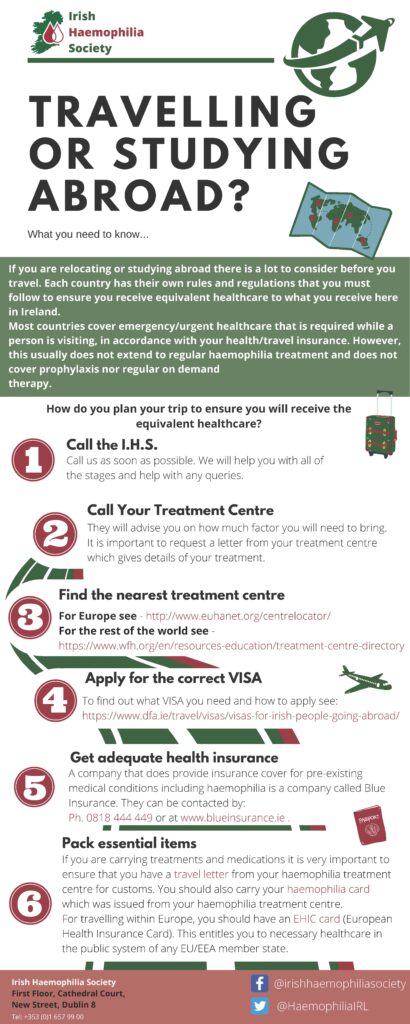Tips to Prepare for your travels
- For travelling within Europe you should have an EHIC card (European Health Insurance Card). This entitles you to necessary healthcare in the public system of any EU / EEA member state, or Switzerland if you become ill or injured while visiting another country. You can apply for the card online at www.ehic.ie
- Visa requirements should be checked well in advance of travel.
- Travel insurance should be checked well in advance of departure as it can be difficult to obtain for a person with haemophilia. A company which does provide insurance cover for a pre-existing medical condition including haemophilia is Blue Insurance. They can be contacted on 0818 444 449 or at www.blueinsurance.ie. Full disclosure is required and there will be some loading, however, this is not a significant amount.
- You will require a letter from the National Coagulation Centre (NCC), at St. James’s Hospital for airport security/customs. The letter should be on headed paper and confirm that you are carrying treatment, needles, syringes etc, as well as relevant information on any metal implants (such as knees or hips) that may set off the security scanners. The letter should not be more than six months old and should be updated as necessary. This letter should be signed by a consultant doctor. If travelling to the USA, the letter should ideally specify the brand name of the factor you will be carrying. To allow for some delays you should pass through security as early as possible.
- Always carry your own treatment (preferably in a small cooler bag), syringes, needles etc. with you as products vary in different countries. A general rule when packing factor, you should bring your regular dose for the duration of your trip plus sufficient factor for at least one extra 100% rise.
- It may be useful to pack one medication information insert and one box cover. In the event that you cannot treat yourself, or if there is a language barrier, this would be useful for the treating doctor.
- National haemophilia organisations and haemophilia treatment centres can also be a source of assistance while travelling abroad. You will find these listed in the WFH Passport which is available online at www.wfh.org. Alternatively, you can contact us at any stage for information on the country you are visiting. Having this information in advance allows you to plan in case of an emergency as not every hospital will have a treatment centre.
- Photocopy all necessary travel documents (tickets, passport, visa, one form of ID, travel letters, insurance policy, etc.) and leave them in an envelope at home where they can be accessed easily in case any of these documents get lost and need to be replaced. A photocopy will speed up the process of replacement documents. Another option would be to place an extra set of copies in your checked in luggage, or you could scan travel documents and send them to yourself in an email.
- If you are planning a long haul flight it may be useful to take some treatment before you leave.
Tips While Travelling
- Ensure you have your I.H.S. Travel Card clearly visible in your wallet and bring details of any insurance cover policy numbers, and contact details with you.
- When in transit (bus, train or plane) always carry your treatment in your hand luggage to prevent loss or breakages. If the trip is long and you have a lot of treatment, carry all the treatment and possibly 5-6 injection kits in your hand luggage. The rest of the injection kits can be stored in your main luggage. You can leave your factor in your carry-on bag. However, it is recommended to put your medication (in a cooler bag) in the tray with your coins, watch, wallet etc. when going through security at the airport. You may be asked to open the bag but if you have your letter you should not have any problem.
- It is important to know how long it is recommended that treatment can be stored out of the refrigerator and also the temperature range at which it can be stored outside of the refrigerator.
- It may also be useful to know if your hotel or hostel has a secure refrigerator, where you can store your treatment, especially in warmer countries.
In case of emergencies
It is highly recommended that you should have a letter on headed paper from the NCC, in St. James’s Hospital, or from your treatment centre with information about your bleeding disorder, the usual treatment you receive and any other medical conditions or information that may be useful in case of emergency. This letter should not be more than six months old. If you need to attend a hospital while you are away, if possible treat yourself first. Accident and Emergency departments can be slow at the best of times and if a translator is required this may add to the delay in getting your treatment.

